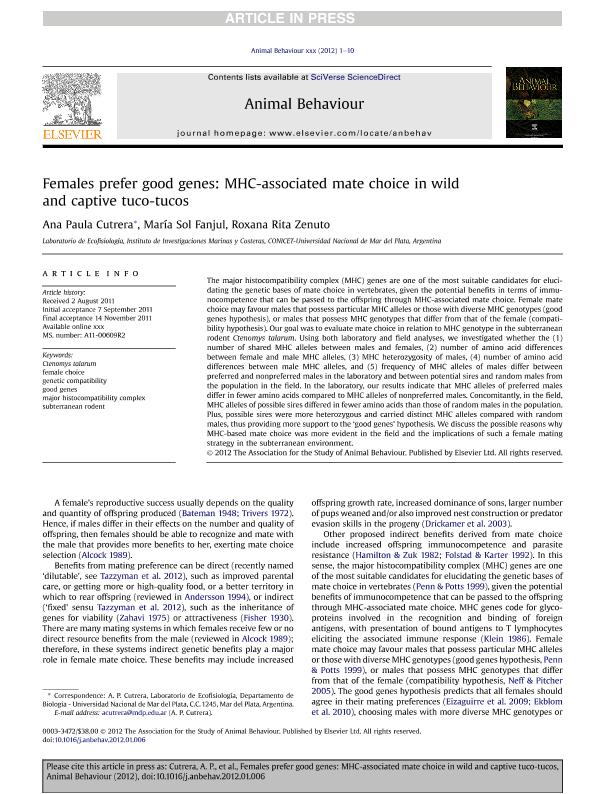Mostrar el registro sencillo del ítem
dc.contributor.author
Cutrera, Ana Paula

dc.contributor.author
Fanjul, Maria Sol

dc.contributor.author
Zenuto, Roxana Rita

dc.date.available
2021-05-10T11:31:00Z
dc.date.issued
2012-03
dc.identifier.citation
Cutrera, Ana Paula; Fanjul, Maria Sol; Zenuto, Roxana Rita; Females prefer good genes: MHC-associated mate choice in wild and captive tuco-tucos; Academic Press Ltd - Elsevier Science Ltd; Animal Behaviour; 83; 3; 3-2012; 847-856
dc.identifier.issn
0003-3472
dc.identifier.uri
http://hdl.handle.net/11336/131727
dc.description.abstract
The major histocompatibility complex (MHC) genes are one of the most suitable candidates for elucidating the genetic bases of mate choice in vertebrates, given the potential benefits in terms of immunocompetence that can be passed to the offspring through MHC-associated mate choice. Female mate choice may favour males that possess particular MHC alleles or those with diverse MHC genotypes (good genes hypothesis), or males that possess MHC genotypes that differ from that of the female (compatibility hypothesis). Our goal was to evaluate mate choice in relation to MHC genotype in the subterranean rodent Ctenomys talarum. Using both laboratory and field analyses, we investigated whether the (1) number of shared MHC alleles between males and females, (2) number of amino acid differences between female and male MHC alleles, (3) MHC heterozygosity of males, (4) number of amino acid differences between male MHC alleles, and (5) frequency of MHC alleles of males differ between preferred and nonpreferred males in the laboratory and between potential sires and random males from the population in the field. In the laboratory, our results indicate that MHC alleles of preferred males differ in fewer amino acids compared to MHC alleles of nonpreferred males. Concomitantly, in the field,MHC alleles of possible sires differed in fewer amino acids than those of random males in the population. Plus, possible sires were more heterozygous and carried distinct MHC alleles compared with random males, thus providing more support to the "good genes" hypothesis. We discuss the possible reasons why MHC-based mate choice was more evident in the field and the implications of such a female mating strategy in the subterranean environment.
dc.format
application/pdf
dc.language.iso
eng
dc.publisher
Academic Press Ltd - Elsevier Science Ltd

dc.rights
info:eu-repo/semantics/openAccess
dc.rights.uri
https://creativecommons.org/licenses/by-nc-sa/2.5/ar/
dc.subject
CTENOMYS TALARUM
dc.subject
FEMALE CHOICE
dc.subject
GENETIC COMPATIBILITY
dc.subject
GOOD GENES
dc.subject
MAJOR HISTOCOMPATIBILITY COMPLEX
dc.subject
SUBTERRANEAN RODENT
dc.subject.classification
Zoología, Ornitología, Entomología, Etología

dc.subject.classification
Ciencias Biológicas

dc.subject.classification
CIENCIAS NATURALES Y EXACTAS

dc.title
Females prefer good genes: MHC-associated mate choice in wild and captive tuco-tucos
dc.type
info:eu-repo/semantics/article
dc.type
info:ar-repo/semantics/artículo
dc.type
info:eu-repo/semantics/publishedVersion
dc.date.updated
2021-04-23T19:24:39Z
dc.journal.volume
83
dc.journal.number
3
dc.journal.pagination
847-856
dc.journal.pais
Estados Unidos

dc.description.fil
Fil: Cutrera, Ana Paula. Consejo Nacional de Investigaciones Científicas y Técnicas. Centro Científico Tecnológico Conicet - Mar del Plata. Instituto de Investigaciones Marinas y Costeras. Universidad Nacional de Mar del Plata. Facultad de Ciencias Exactas y Naturales. Instituto de Investigaciones Marinas y Costeras; Argentina
dc.description.fil
Fil: Fanjul, Maria Sol. Consejo Nacional de Investigaciones Científicas y Técnicas. Centro Científico Tecnológico Conicet - Mar del Plata. Instituto de Investigaciones Marinas y Costeras. Universidad Nacional de Mar del Plata. Facultad de Ciencias Exactas y Naturales. Instituto de Investigaciones Marinas y Costeras; Argentina
dc.description.fil
Fil: Zenuto, Roxana Rita. Consejo Nacional de Investigaciones Científicas y Técnicas. Centro Científico Tecnológico Conicet - Mar del Plata. Instituto de Investigaciones Marinas y Costeras. Universidad Nacional de Mar del Plata. Facultad de Ciencias Exactas y Naturales. Instituto de Investigaciones Marinas y Costeras; Argentina
dc.journal.title
Animal Behaviour

dc.relation.alternativeid
info:eu-repo/semantics/altIdentifier/url/https://www.sciencedirect.com/science/article/abs/pii/S0003347212000267
dc.relation.alternativeid
info:eu-repo/semantics/altIdentifier/doi/https://doi.org/10.1016/j.anbehav.2012.01.006
Archivos asociados
